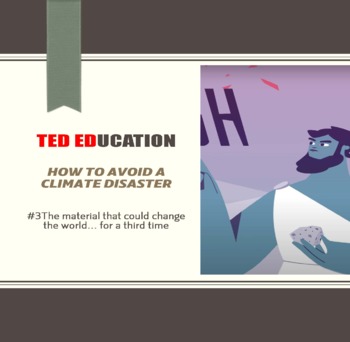[TED ED] 3. The material that could change the world Worksheet
Moonlight English
53 Followers
Grade Levels
8th - 12th, Higher Education, Adult Education, Homeschool
Subjects
Resource Type
Standards
CCSSRI.9-10.3
CCSSRI.9-10.6
CCSSRI.9-10.9
CCSSRI.9-10.10
Formats Included
- PDF
Pages
12 pages
Moonlight English
53 Followers
Also included in
- TED ED [How to Avoid a Climate Disaster] Playlists Contents1 The “myth” of the boiling frog2 The world's biggest battery looks nothing like a battery3 The material that could change the world... for a third time4 How much electricity does it take to power the world?5 How much land does it take to poPrice $12.60Original Price $14.00Save $1.40
Description
Among TED ED playlists, 'how to avoid a disaster' contains 7 themes and it's the 3rd one "The material that could change the world". This worksheet is made from ted lessons embedded in the program. It consists of about 5-9 comprehension questions and Think Deep questions. Plus, it also has vocabulary lists, answer keys, and the scripts of the TED ED video. I will add more worksheets of the same kind. I hope it will be helpful. Thank you.
Total Pages
12 pages
Answer Key
Included
Teaching Duration
1 hour
Report this resource to TPT
Reported resources will be reviewed by our team. Report this resource to let us know if this resource violates TPT’s content guidelines.
Standards
to see state-specific standards (only available in the US).
CCSSRI.9-10.3
Analyze how the author unfolds an analysis or series of ideas or events, including the order in which the points are made, how they are introduced and developed, and the connections that are drawn between them.
CCSSRI.9-10.6
Determine an author’s point of view or purpose in a text and analyze how an author uses rhetoric to advance that point of view or purpose.
CCSSRI.9-10.9
Analyze seminal U.S. documents of historical and literary significance (e.g., Washington’s Farewell Address, the Gettysburg Address, Roosevelt’s Four Freedoms speech, King’s “Letter from Birmingham Jail”), including how they address related themes and concepts.
CCSSRI.9-10.10
By the end of grade 9, read and comprehend literary nonfiction in the grades 9-10 text complexity band proficiently, with scaffolding as needed at the high end of the range.By the end of grade 10, read and comprehend literary nonfiction at the high end of the grades 9-10 text complexity band independently and proficiently.



